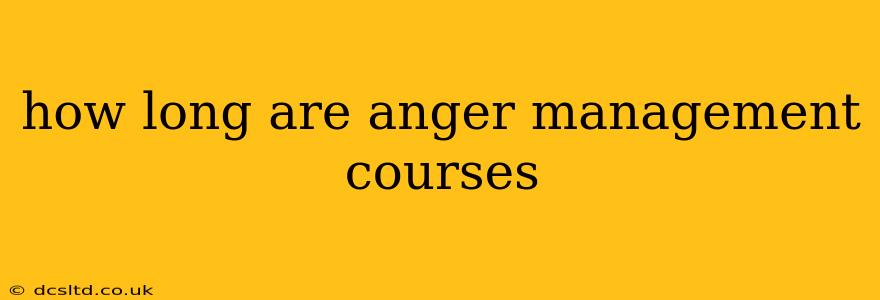How Long Are Anger Management Courses?
The length of anger management courses varies significantly depending on several factors. There's no one-size-fits-all answer, but understanding these variables will help you determine what to expect. This guide will explore the typical duration, influencing factors, and what you can anticipate from different program formats.
What factors influence the length of anger management courses?
Several factors contribute to the overall length of an anger management program:
- Intensity of the program: Some programs are intensive, meeting multiple times per week for several weeks. Others might be less intensive, meeting once a week for a longer duration.
- Individual needs: The severity of anger issues and the individual's personal goals will influence the length of treatment. Someone with mild anger issues might complete a shorter course, while someone with more severe issues or co-occurring mental health conditions may require a longer, more comprehensive program.
- Program format: Anger management programs are offered in various formats, including in-person group therapy, individual therapy, online courses, and workshops. The format significantly impacts the program's duration. For instance, a short online workshop might only last a few hours, while a comprehensive in-person group therapy program could extend over several months.
- Course curriculum: The content covered in the course also influences its length. Some programs focus solely on anger management techniques, while others incorporate broader aspects of emotional regulation, stress management, and conflict resolution.
What are the typical lengths of anger management courses?
While highly variable, here's a general overview:
- Short-term courses: These might range from a few hours (workshops) to several weeks (short group programs). They often provide an introduction to anger management techniques and strategies.
- Intermediate-length courses: These usually last for several weeks to a few months. They provide a more in-depth exploration of anger management, often including homework assignments, practice exercises, and individual feedback.
- Long-term courses: These programs may extend over several months or even longer, offering intensive support and addressing underlying issues contributing to anger. They are typically reserved for individuals with severe anger issues or co-occurring conditions.
How long are online anger management courses?
Online anger management courses are highly variable in length. Some are short, self-paced modules lasting a few hours, while others are structured programs that unfold over several weeks or months, mirroring the timeline of in-person programs. The length will depend on the course content and the learning platform’s design.
Are there anger management programs shorter than 8 weeks?
Yes, many anger management programs are shorter than eight weeks. As previously mentioned, workshops, short online modules, and some brief group therapy programs can be completed in a shorter timeframe. The best duration depends on your individual needs and the program's goals.
What should I expect from an anger management course?
The specific content of each course will vary, but you can generally expect to learn about:
- Identifying triggers: Understanding what situations, thoughts, and feelings lead to anger.
- Developing coping mechanisms: Learning healthy ways to manage anger, such as relaxation techniques, communication skills, and problem-solving strategies.
- Improving communication skills: Learning how to express needs and boundaries assertively, without resorting to anger.
- Understanding the consequences of anger: Recognizing the negative impacts of uncontrolled anger on relationships, work, and overall well-being.
- Addressing underlying issues: Exploring potential underlying issues contributing to anger, such as trauma, stress, or mental health conditions.
Ultimately, the duration of your anger management course will depend on your specific situation and the program you choose. It's crucial to choose a program that is right for you and addresses your individual needs. Consulting with a mental health professional can help determine the most suitable course of action.
